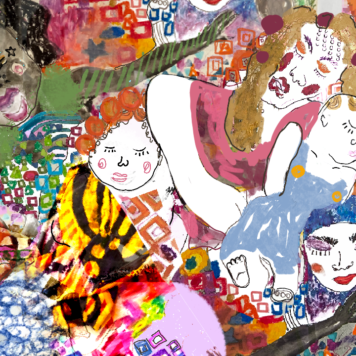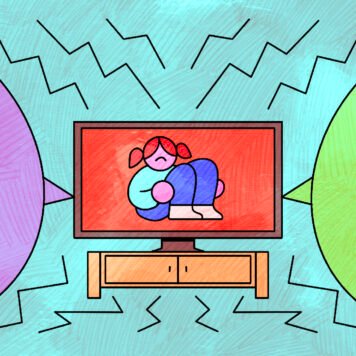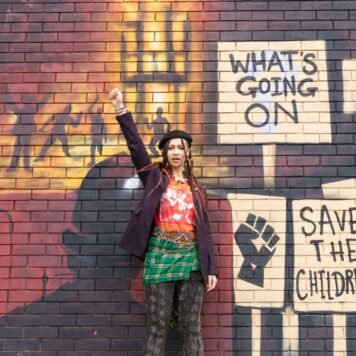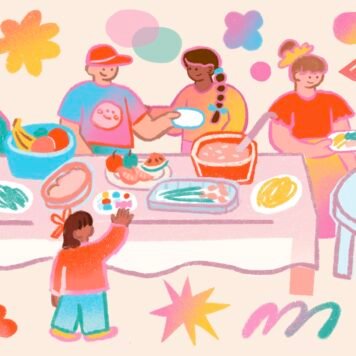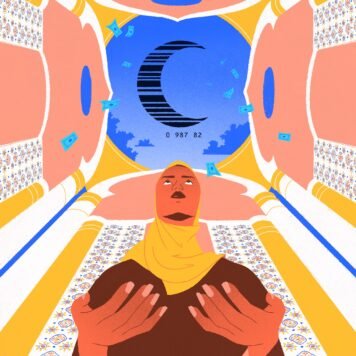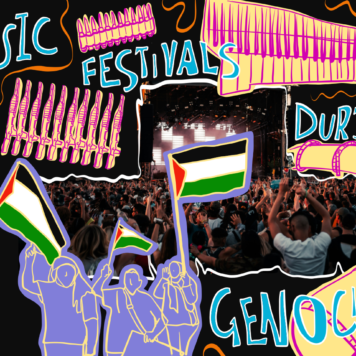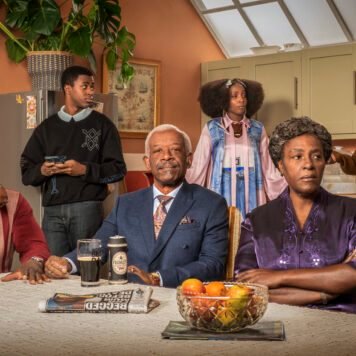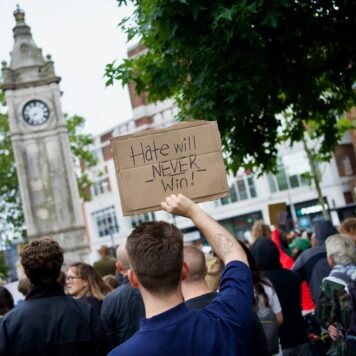To navigate racism is to constantly be in chess mode. Staying steps ahead is key to survival. The vigilance we hold on to while we’re steering through society; from school to work, to healthcare and everything in between, is overshadowed by constantly making these micro calculations. While we might sometimes question if this is over the top, author, activist and academic Nicola Rollock reminds us that we act this way not because we’re being paranoid, but because we have learned, being raised in the UK, that this is a necessity for our survival. It’s a psychological tool needed for our safety.
I sat down with Nicola in a quiet cafe in central London to talk more about this and her new book ‘The Racial Code: Tales of Survival and Resistance’. Throughout the text, she crafts compelling and engaging stories which explore the definition of everyday racism – that is, racism in its most subtle forms – its prevalence, and how Black people are working in a very strategic and purposeful way to navigate through that. Discussing these microaggressions filled the majority of our time, an hour which felt like 10 minutes. Filled with humour, insight and advice, I felt an overwhelming sense of camaraderie throughout – and a fire in my belly.

Naming the problem (racism/the maddening experience)
As Nicola writes, naming the problem of racism isn’t to tell the world it exists – we know it does. Rather, to properly name a problem we must point to its tools, histories, techniques, perpetrators and victims. We must voice our strategy for collective care and discuss the actions we plan to take to tackle racial inequality at its roots.
Our endgame is to leverage our collective power to raise the standard of existence for Black people in the UK and across the world to go beyond survival, for us to experience life in its fullness. Tangibly, Nicola describes this in our chat as being able to “walk down the road and swing my hips in a carefree way, because I’m not worried about the outcomes for someone who looks like me.”
Naming the problem is also Nicola’s nod to the ways Black people are working – hard – to navigate the system of white supremacy, and how exhausting this is. Naming it is to collectively say: I see you.
In the book, she describes the actions we take, such as Black mothers teaching their “Black sons: not to wear caps, change out of gym wear back into their daily wear, and know different forms of stop and search legislation, but not to tell the police that you know these forms of legislation before the police see you as ‘uppity’.” Nicola brings our collective survival practices together in one place and, in doing so, reveals the tension between our actions. In many ways, as she reinforced during our chat, “it is the case that we’re leading somewhat of a maddening existence.”
Maddening racism in the workplace
I found some chapters of the book hilarious. ‘Surviving Babylon’ includes pointers such as: “never leave your office door unlocked, don’t leave your food unattended. Look out for white people who might have blue or pink or green hair who are self-proclaimed allies.” Within Nicola’s tongue-in-cheek scenarios, you do sit back in disbelief when you recognise that this is our reality.
The maddening consequence of living in a society where you’re shaped by these forms of racism is that we all have had experiences like this. In the UK we may often feel isolated by these experiences, or share them only with friends. And Nicola points out that this a vital part of how the racism we endure functions: to make you feel like it’s just you. It’s not. As author Toni Morrison says: “The very serious function of racism is a distraction. It keeps you from doing your work. It keeps you explaining, over and over again, your reason for being.” What we’re experiencing is this process. It’s historic and it’s pervasive.
While the workplace isn’t Nicola’s entire focus point in the book, I find it useful as a site of structural racism and tension which plays out in the wider world. During our interview, she points out that “for us as Black people, we know that script – we’ve seen it play out. I want to map it out in detail and expose the hypocrisy of a system that on one hand says we’re committed to equality and diversity, but on the other continues to behave in a way that undermines that agenda.”
Examples of these attitudes are historic, but more recently include: Universities make commitments to anti-racism and racial equality, yet the Black attainment gap exists, Black and POC officers and staff face racism, or the continued memorialising of past slave owners. We saw workplaces plaster Black squares all over their socials in support of racial equality in 2020, only for Black and POC staff to still be paid less and laid off more often than their white peers two years later.
My own experiences of racism in an apparently “anti-racist” workplace includes Black and Asian staff being expected to lead anti-racism work – an unpaid and overwhelming role – for the whole organisation, while their white counterpoints could avoid these seminars altogether.
Battling racism collectively
But how do we fix it? Dismantling racism in the workplace will not take an individual event or a series of talks – rather it is an ongoing collective need to take down a system that creates and enables this violence with little to no consequence. In action, this looks like the redistribution of pay; it looks like ensuring zero-hour contracted workers (who will most likely be Black or POC) are entitled to the same work rights and benefits as other in-house workers. It looks like swift and effective penalties for those who perpetrate racism.
It’s about reckoning with the UK’s historical and present embedding of racism into all aspects of society: healthcare, green spaces, housing, education, food, air, water, borders and security and so much more. From the policies and practices businesses enact, to the sponsorships they accept, we need to examine this system of violence and build better structures in its place.
The weight of everyday racism
In this vein, Nicola would like to see “institutions have a more sophisticated understanding of the dynamics of everyday racism, and the burden it places on us as Black people.” The pervasiveness of racism as a structure and how this plays out within our lives is traumatic. Nicola has a clear focus on the mental, emotional and physical consequences of the kind of fighting that is required of us to constantly survey the land for potential threats and dangers. Our nervous system is shaken by our constant fight or flight responses. That’s not a healthy existence.
Nicola begins her chapter ‘Tap Shoes’ with a quote from William A. Smith, a colleague at Utah University. Smith says: “Racial battle fatigue develops in African American and other people of colour much like combat fatigue in military personnel, even when they are not under direct (racial) attack. Unlike typical occupational stress, racial battle fatigue is a response to the distressing mental/emotional conditions that result from facing racism daily (e.g racial slights, recurrent indignities and irritations, unfair treatments [..] and potential threats or dangers under tough to violent and even life-threatening conditions)”. He clearly outlines the damaging impact of racism for Black folks in the US: on their physical bodies (through increased blood pressure) and mental health (through higher levels of stress). Nicola believes the toll of racism is equally detrimental to our overall longevity and wellbeing in the UK.
While this toll has always been too big of a cross to bear, especially individually, historically, collectivism has always been the balm that soothes. Collectivism implies we share the burden. With each generation, we build on the experiences, lessons, and visions – and become wiser to the ways racism relies on the same tactics of destruction faced by those before us. By learning from our elders and our peers, sharing material resources, advice, our homes, our influence, our time and our labour, we begin to build the responses to community care and racism that are intentional and sustainable in the long term.
As Black people, what are our collective demands?
Black people have a long tradition of campaigning for racial justice. Nicola wants to see this tradition continue with stronger and more collective demands for justice. She writes: “if we understand that this is a society that doesn’t always work in our favour, and certainly, historically has been shown not to work in our favour. What do we do if we take that historical lens? What do we do now?”
The answer is, we’ve got to be strategic about it – and to be strategic, we must work collectively. Similarly to chess, when nearing the endgame (or checkmate), the key tactics are to coordinate an attack on the King (or in this case structural racism) and watching out for the safety of your own King (or in this case, Black people as a collective). You cannot usually checkmate the King with just one piece. Usually, it takes many pieces working together to checkmate. So, from housing to healthcare, to law and environment, to arts and culture: we need Black people in all areas of society to make moves in their individual spaces and come together for collective effect.

Sometimes we may be so focused on the opponents’ King that we forget to watch our own. We have to remember that racism and white supremacy are an evolving machine destined to keep running at all costs and they’re always planning their next attack. Watching out for Black people as a collective, in this case, is understanding how pooling intergenerational knowledge on how racism rears its ugly head within all facets of life is key to how we build strategic demands for – and responses to – the compounding impacts of these threats on our collective freedom.
At the moment, we are operating in an individualistic way which is not only detrimental to the individual’s health and wellbeing; it also fails to collectively raise our standard of treatment – everything is seen as a ‘one off’ incident, rather than ongoing symptoms of racial violence. For our needs to be met, we need to connect and collaborate. Imagine we’re sitting on one side of the room, and we need to get to the other side. We’re individually trying to navigate the room without paying attention to the fact that our friend might know particular manoeuvres that we need to make in order to avoid a dangerous spot. We’re trying to get to the other side without recruiting the help of the people around us.
Subscribe to shado's weekly newsletter
Exclusive event news, job and creative opportunities, first access to tickets and – just in case you missed them – our picks of the week, from inside shado and out.

It doesn’t have to be this way. As I speak to Nicola, I think about the ways Black people have been collectively organising throughout history. From the Squatters Handbook and Black Supplementary Schools, to the ways our elders have passed down oral knowledge to other new immigrants to the UK, guiding them through racist institutions from housing to education. Collectivism even exists within our families: our parents advising us on how to confront and avoid microaggressions as we’re on our way to school – and it’s time to formalise and implement this on a wider level.
As our conversation nears its end, Nicola reminds me of the importance of “a collective understanding of how we can come together, but also a wider lens about how racial justice plays out in this country.” I take this to mean that there must be a collective understanding of how to navigate the system, while also educating people on how to take that very system down.
She continues: “because we don’t name these processes, each generation is regurgitating the pain, regurgitating the struggle, as if it’s new”. We have to find a deliberate way of passing on information in an accessible way for all Black people because systemic racism is reliant on our ignorance, passivity and fragmented collectiveness. And as Nicola concludes, “We have to be clear of our demands and clear what success looks like for you, for people who look like you and work collectively towards that.”
That’s how we checkmate.
What can you do?
Think about the ways you can speak about your work, healthcare, housing and general living experiences with colleagues, friends, family and those in your community young and old. To begin having these open conversations about our treatment, we start with those around us. Also…
Read these books to learn more about Black British resistance:
- Surge by Jay Bernard
- Natives by Akala
- Here to Stay, Here to Fight edited by Paul Field, Robin Bunce, Leila Hassan and Margaret Peacock
- There Ain’t No Black in the Union Jack by Paul Gilroy
- Heart of the Race: Black Womens live in Britain by Beverley Bryan, Stella Dadzie, and Suzanne Scafe
- Black Resistance to British Policing by Adam Elliott-Cooper
- Abolition Revolution by Aviah Sarah Day and Shanice Octavia McBean
- A Quick Ting on British Black Power by Chanté Joseph
Listen and learn about the Black British existence and resistance:
Listen to these playlists:
- War Inna Babylon: The Soundtrack to the ICA Exhibition
- Experiments in Imagining Otherwise
- Divest to Decolonise
Follow:



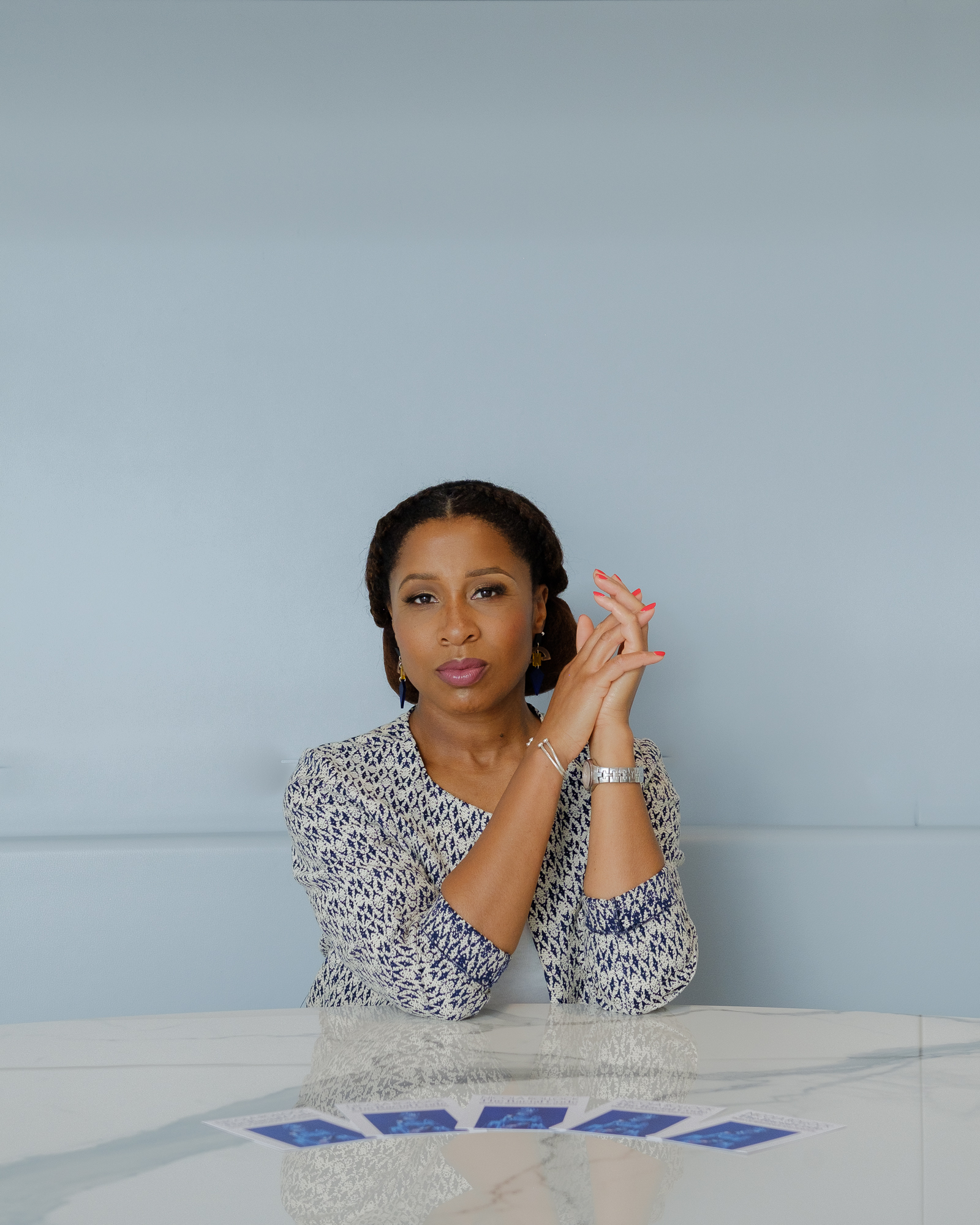 Photography by Mario Washington-Ihieme @maz_o
Photography by Mario Washington-Ihieme @maz_o


